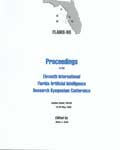Published:
May 1998
Proceedings:
Proceedings of the Eleventh International Florida Artificial Intelligence Research Society Conference (FLAIRS 1998)
Volume
Issue:
Proceedings of the Eleventh International Florida Artificial Intelligence Research Society Conference (FLAIRS 1998)
Track:
All Papers
Downloads:
Abstract:
Reinforcement learning (RL) problems constitute an important class of learning and control problems faced by artificial intelligence systems. In these problems, one is faced with the task of providing control signals that maximize some measure of performance, usually taken over time, given feedback that is not in terms of the control signals themselves. This feedback is often called "reward" or "punishment." However, these tasks have a direct relationship to engineering control, as well as the more cognitive intelligence related areas suggested by these terms (Barto, 1990). In recent years, many algorithms for RL have been suggested and refined. Notable are those discussed by Sutton, Barto, and Watkins (1989), Holland’s Bucket Brigade (Holland et al., 1986), Watkin’s Q-learning algorithm (Watkins and Dayan, 1992), and others. Despite these advances, there remains no standard, analytical methods or test suites for empirically evaluating reinforcement learning systems. Most test problems in RL are in abstract, difficult to analyze forms (e.g., maze problems, the inverted pendulum, etc.). This paper describes a method for designing arbitrary numbers of RL test problems with clear, parameterizable characteristics. An additional contribution of this method is a clear identification of parameters for RL environment complexity. Although the method described is primarily suggested for RL problem design and RL method evaluation, its parameters could be used for analysis of extant RL test problems. The following sections outline basic RL nomenclature, followed by the development of Walsh transform based design techniques for a limited class of RL problems. Straight forward extensions of these techniques to a broad class of RL problems are also provided. Use of these techniques are further extensions are discussed.

FLAIRS
Proceedings of the Eleventh International Florida Artificial Intelligence Research Society Conference (FLAIRS 1998)
ISBN 978-1-57735-051-4
Published by The AAAI Press, Menlo Park, California
